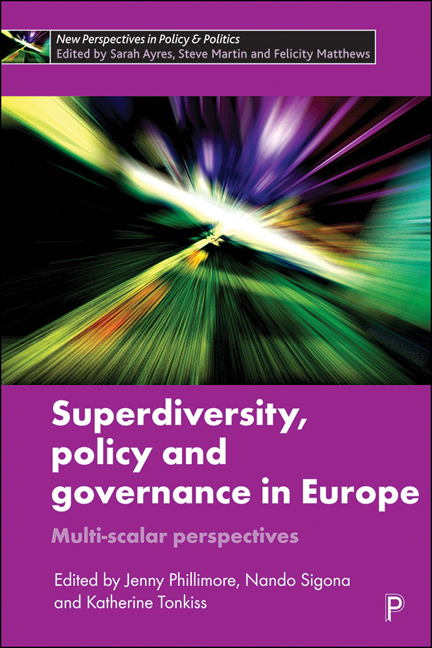Book contents
- Frontmatter
- Contents
- List of Figures and Tables
- Notes on Contributors
- Introduction: Superdiversity, Policy and Governance in Europe
- Chapter One Managing Superdiversity? Examining the Intercultural Policy Turn in Europe
- Chapter Two Mainstreaming in Response to Superdiversity? The Governance of Migration-Related Diversity in France, The UK and the Netherlands
- Chapter Three Making the Most of Superdiversity: Notes on the Potential of a New Approach
- Chapter Four Superdiversity and Sub-National Autonomous Regions: Perspectives from the South Tyrolean Case
- Chapter Five Transmigration: The Rise of Flexible Migration Strategies as Part of Superdiversity
- Chapter Six Superdiversity, Multiculturalism and Local Policies: A Study on European Cities
- Chapter Seven Integrating Superdiversity in Urban Governance: The Case of Inner-city Lisbon
- Chapter Eight Urban Planning and the Challenge of Superdiversity
- Chapter Nine Superdiversity in the Post-Industrial City: A Comparative Analysis of Backlash Narratives in Six European Neighbourhoods
- Index
Chapter Five - Transmigration: The Rise of Flexible Migration Strategies as Part of Superdiversity
Published online by Cambridge University Press: 04 March 2021
- Frontmatter
- Contents
- List of Figures and Tables
- Notes on Contributors
- Introduction: Superdiversity, Policy and Governance in Europe
- Chapter One Managing Superdiversity? Examining the Intercultural Policy Turn in Europe
- Chapter Two Mainstreaming in Response to Superdiversity? The Governance of Migration-Related Diversity in France, The UK and the Netherlands
- Chapter Three Making the Most of Superdiversity: Notes on the Potential of a New Approach
- Chapter Four Superdiversity and Sub-National Autonomous Regions: Perspectives from the South Tyrolean Case
- Chapter Five Transmigration: The Rise of Flexible Migration Strategies as Part of Superdiversity
- Chapter Six Superdiversity, Multiculturalism and Local Policies: A Study on European Cities
- Chapter Seven Integrating Superdiversity in Urban Governance: The Case of Inner-city Lisbon
- Chapter Eight Urban Planning and the Challenge of Superdiversity
- Chapter Nine Superdiversity in the Post-Industrial City: A Comparative Analysis of Backlash Narratives in Six European Neighbourhoods
- Index
Summary
Introduction
In the last decades, several concepts have been put forward to capture the shape and impact of demographic changes in western societies as a consequence of human mobility. Changes in these concepts reflected changing views and understandings of this new reality. Thus, the concept of multiculturalism has been gradually replaced by the concept of (super) diversity (Vertovec, 2007; Meissner and Vertovec, 2014; Boccagni, 2015b; Geldof, 2016). Moreover, within social sciences, views on the process of human movement itself have evolved: originally, migration was understood as a unidirectional, purposeful and intentional process from one state of fixity (in the place of origin) to another (in the destination country). However, this is not the pattern most newcomers in Europe today follow. Increasingly, people accumulate – by choice or by necessity – multiple mobilities and different trajectories; they become transmigrants (Schrooten et al, 2016b). In our research, transmigration is understood as a form of mobility that implies serial cross-border mobility, either between two countries or more, as is the case with complex migration trajectories (Schrooten et al, 2016c). More recent scientific insights explicitly point to the importance of these ‘multiple, overlapping and turbulent processes of migration, dislocation, displacement, disjuncture and dialogism’ (Urry, 2007, 35), emphasising the co-existence of many different forms of movement, ranging from shortterm temporary movements to permanent migration.
The impact of these complex forms of mobility and diversity has also been described in social work literature. In general, social work researchers argue that social work practices are not yet fully equipped to deal with a clientele presenting an increasing diversity regarding ethnicity, religion, language and immigration status (Furman et al, 2010; Phillimore, 2015; Furman et al, 2016). Social workers are often unfamiliar with these complexities inherent to superdiversity, and may reproduce one-dimensional and reductionist frames of reference, reducing the social problems with which they are confronted to mere ethnicity or culture (Boccagni, 2015a). Social welfare policies and practices may thus contribute to the structural exclusion of newcomers, as they are, for instance, not equipped to deal with multilingualism and exclude people with particular immigration statuses from certain rights or welfare allocations.
- Type
- Chapter
- Information
- Superdiversity, Policy and Governance in EuropeMulti-scalar Perspectives, pp. 100 - 121Publisher: Bristol University PressPrint publication year: 2020



